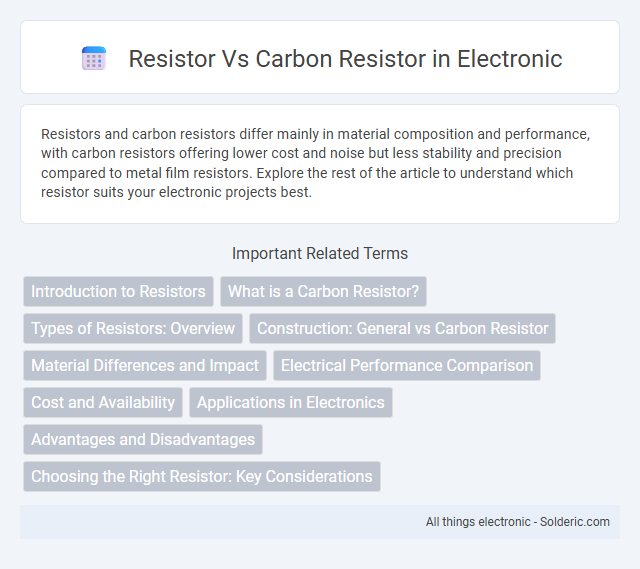Resistors and carbon resistors differ mainly in material composition and performance, with carbon resistors offering lower cost and noise but less stability and precision compared to metal film resistors. Explore the rest of the article to understand which resistor suits your electronic projects best.
Comparison Table
| Feature | Resistor | Carbon Resistor |
|---|---|---|
| Material | Varies (metal film, wire wound, carbon) | Carbon composition |
| Resistance Range | Wide (ohms to megaohms) | Typically 1 ohm to 10 MO |
| Tolerance | +-1% to +-5% | +-5% to +-20% |
| Power Rating | 0.125W to several watts | Typically 0.25W to 0.5W |
| Noise | Low in metal film; varies | Higher electrical noise |
| Temperature Stability | Better stability | Poor temperature stability |
| Cost | Moderate to high | Low cost |
| Applications | Precision circuits, audio, instrumentation | General purpose, low-cost applications |
Introduction to Resistors
Resistors regulate electrical current by providing precise resistance in circuits, crucial for maintaining stable voltage and protecting components. Carbon resistors, made from a carbon composite, offer cost-effective resistance with moderate tolerance and noise levels, often used in low-power applications. Your choice between resistors and carbon resistors depends on factors like power rating, accuracy, and circuit sensitivity.
What is a Carbon Resistor?
A carbon resistor is a type of resistor made from a carbon composition material, which combines finely ground carbon particles with a binder to control electrical resistance. These resistors are known for their ability to handle high energy pulses and are commonly used in electronic circuits for voltage regulation and current limiting. Understanding your circuit's requirements helps determine if a carbon resistor is suitable due to its characteristic tolerance and noise levels compared to other resistor types.
Types of Resistors: Overview
Resistors come in various types, each designed for specific electrical functions; carbon resistors are a common type known for their cost-effectiveness and wide resistance range. Carbon resistors use a carbon film or carbon composite material to control current flow, offering moderate precision and noise levels compared to metal film or wirewound resistors. Understanding the differences between resistor types helps you select the best component for your electronic projects to ensure optimal performance and durability.
Construction: General vs Carbon Resistor
General resistors can be constructed using various materials such as metal film, wirewound, or carbon composition, each offering distinct performance characteristics and durability. Carbon resistors specifically use a mixture of carbon powder and a binding material, shaped into a cylindrical form that provides moderate precision and a higher noise level compared to metal film resistors. The carbon resistor's construction results in a cost-effective and widely used component, but it generally has lower stability and tolerance under varying environmental conditions.
Material Differences and Impact
Resistors typically use metal film or wire-wound materials, providing precise resistance and stability, while carbon resistors utilize carbon composition or carbon film, known for higher noise levels and tolerance variations. The carbon material in resistors causes greater temperature coefficients, affecting performance in sensitive circuits compared to metal-based resistors. Carbon resistors are cost-effective and suitable for general-purpose applications, but metal film resistors deliver superior accuracy and durability in high-precision environments.
Electrical Performance Comparison
Carbon resistors generally exhibit higher noise levels and less stability compared to metal film resistors, affecting precision in sensitive circuits. Their tolerance ranges are typically wider (+-5% or more), whereas metal film resistors offer tighter tolerances (+-1% or better) and superior temperature coefficients. Metal film resistors provide improved electrical performance with lower thermal noise, making them ideal for applications requiring high accuracy and reliability.
Cost and Availability
Carbon resistors are typically more affordable and readily available, making them a practical choice for budget-conscious projects and educational purposes. Metal film resistors, often considered more precise, usually come at a higher cost and might be less accessible in certain markets. Your decision should balance cost, availability, and the specific accuracy requirements of your application.
Applications in Electronics
Carbon resistors are widely used in low-cost, general-purpose electronic circuits such as radios, televisions, and basic signal processing due to their affordability and acceptable tolerance levels. Metal film resistors, often preferred for precision applications, provide better stability and lower noise, making them ideal for sensitive devices like audio equipment and measuring instruments. Choosing the right resistor significantly affects your circuit's performance, especially in terms of accuracy and noise reduction.
Advantages and Disadvantages
Resistors offer high stability, precision, and low noise, making them ideal for applications requiring accurate resistance values. Carbon resistors are cost-effective and provide better tolerance to high energy pulses but suffer from higher noise levels and less stability over time. Choosing between them depends on the application's need for durability, precision, cost, and noise sensitivity.
Choosing the Right Resistor: Key Considerations
Choosing the right resistor involves evaluating factors such as resistance value, power rating, tolerance, and noise characteristics, which vary significantly between metal film and carbon resistors. Carbon resistors typically exhibit higher noise levels and wider tolerance ranges but are preferred for their cost-effectiveness and ability to handle high energy pulses. Selecting between carbon and metal film resistors depends on application requirements like precision, stability, and environmental conditions to ensure optimal circuit performance.
resistor vs carbon resistor Infographic

 solderic.com
solderic.com